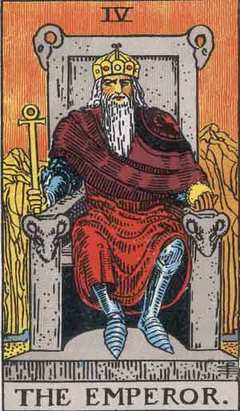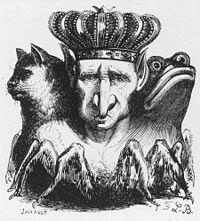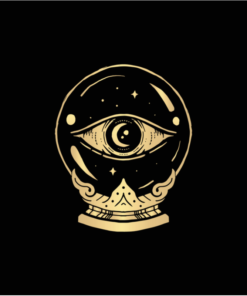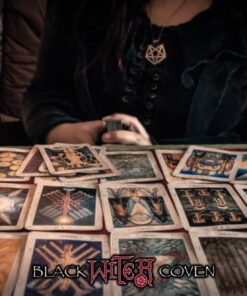Demonic Associations to The Emperor Tarot Card
The Emperor Tarot card, numbered IV in the Major Arcana, represents authority, structure, stability, power, control, and leadership. It embodies the qualities of masculine energy, rule, and discipline. The Emperor is often seen as a figure of dominance, order, and protection, and he governs over the realm with wisdom, but also with the strength to enforce his will.
In demonology, the demons or spirits associated with the Emperor card would likely be those who represent power, authority, and control, as well as the ability to manifest and enforce order in the material world.
Demonic Associations with the Emperor Tarot Card:
- Asmodeus (Demon of Lust and Control): Asmodeus, often depicted as one of the Seven Princes of Hell, is a demon strongly associated with control, authority, and domination. While his primary domain is lust, Asmodeus also represents the exertion of willpower and the ability to control one’s desires and the desires of others. This resonates with the Emperor’s qualities of mastering the material world and enforcing control over people or situations.
- Authority and Structure: Asmodeus, in his role as a demon of desire and control, enforces boundaries, rules, and structure in relationships or situations.
- Dominance: Asmodeus symbolizes the exercise of personal power, which aligns with the Emperor’s role as a leader or ruler.
Connection to the Emperor: Asmodeus is often linked to maintaining and upholding power dynamics, making him a fitting match for the Emperor card’s themes of authority and structure.
- Belial (Demon of Independence and Authority): Belial is one of the Seven Princes of Hell and is traditionally associated with independence, rebellion, and power. He is known for his ability to inspire and maintain independence, but also for his capacity to create and break orders. Belial is often seen as a demon who brings about a new order, forcing individuals to take control of their own destinies.
- Authority and Power: While Belial represents rebellion against conventional power structures, he also governs the energy of empowerment and personal authority, much like the Emperor does when he asserts control.
- Leadership and Strength: Belial’s essence is one of self-rule and dominance over one’s own life, akin to the Emperor’s mastery over his domain.
Connection to the Emperor: Belial’s association with power, control, and self-rule makes him a fitting counterpart to the Emperor card, representing both authority and independence.
- Paimon (Demon of Knowledge and Leadership): Paimon, another prominent demon from the Ars Goetia (a section of the Lesser Key of Solomon), is known for his ability to grant knowledge, power, and the ability to lead. As a demon of wisdom and leadership, Paimon is often invoked for guidance in positions of power, and to help one assert dominance or control in various spheres of life, particularly in situations requiring strategy and decision-making.
- Leadership and Command: Paimon is often associated with rulership and command, aligning with the Emperor’s qualities of leadership and the ability to organize and maintain authority.
- Structure and Order: Paimon is said to help in structuring and organizing knowledge and forces, much as the Emperor card symbolizes the order and stability that must be maintained in any system.
Connection to the Emperor: Paimon’s connection to knowledge and dominance over others through leadership and wisdom ties him to the Emperor card, emphasizing strategic authority and the ability to lead effectively.
- Mammon (Demon of Greed and Material Wealth): Mammon is the demon traditionally associated with wealth, materialism, and earthly power. As the personification of greed and the accumulation of material wealth, Mammon also represents the ability to control and manipulate the material world, a core trait of the Emperor card.
- Material Control: Mammon’s dominion over wealth and material power makes him a fitting symbol for the Emperor, who is often seen as the ruler of the physical and material world.
- Authority in Material Affairs: The Emperor’s concern with practical matters, finance, and the sustenance of the kingdom aligns with Mammon’s role in overseeing material success and the ability to control resources.
Connection to the Emperor: Mammon represents the material authority and the power to control wealth, making him a relevant demon for the Emperor, who governs with both material resources and practical wisdom.
- Satan (Demon of Rebellion and Sovereignty): Satan is often associated with sovereignty, rebellion, and the exercise of ultimate authority, especially in the context of challenging divine power or the status quo. In the context of the Emperor card, Satan represents the ultimate ruler, someone who can assert control, whether in opposition to existing powers or in the establishment of their own rule.
- Authority and Command: Satan’s role as a leader and ruler over the infernal realms directly connects to the Emperor’s role as a ruler and figure of command.
- Rebellion and Sovereignty: Satan’s ability to defy established authority mirrors the Emperor’s ability to assert control over others, creating his own realm or domain.
Connection to the Emperor: Satan’s sovereignty, leadership, and mastery over his realm make him a fitting parallel to the Emperor card, particularly in the sense of an individual who asserts total authority over their surroundings.
So….
The Emperor card represents authority, structure, discipline, and the manifestation of power. The demons associated with the Emperor are often figures of control, leadership, and rulership—those who can establish, maintain, or challenge systems of power.
- Asmodeus: Represents control, authority, and dominance.
- Belial: Symbolizes independence, rebellion, and empowerment.
- Paimon: Associated with leadership, command, and strategic authority.
- Mammon: Tied to wealth, materialism, and control of resources.
- Satan: Represents sovereignty, rebellion, and the assertion of ultimate control.
Each of these demons, in their own way, embodies qualities that align with the Emperor’s themes of asserting control, mastering the material realm, and being the dominant force in one’s life or domain.
The Mover and Shaker Card in Traditional Tarot Meaning

You arrive at the path of the mover and shaker. The Emperor represents the path of power, obedience and control. He is the father and builder of structures and assumes command of his life, environment, body, temperament, instincts and affairs of his heart.
Astrologically the Emperor is ruled by Aries, connected to Mars, a leader, mover and shaker, fearless and forging ahead. He is direct, has no hidden agenda, and can be either demanding or charismatic.
The Major Arcana Represents Major Life Lessons: If the Emperor comes out on the first card of your reading, there will be a definite change because you are in a hurry. If the Emperor appears in the outcome of the reading in a positive position, there may be new opportunities that you will go after that will bring success.
The Story Of The Emperor Tarot Card
The Emperor is enumerated four, a stable number that denotes security, authority, control, responsibility, and experience. The number four can be disrupted only with great difficulty, for this number has the strength of Hercules in the Major Arcana. But stagnation, the Emperor’s weakness, ever threatens to rob him of his focus.
The card’s background is bright orange woven with yellow. Orange indicates energy, intelligence, determination, confidence, ambition, and action, while yellow represents creativity, intellect, mental activity, clarity and enlightenment. His formidable stone throne — a sign that he is rigid and set in his ways — with its emblem of the ram, represents the power of majestic royalty, a position of solid, earned strength typical of the Aries cardinal fire sign. This power and authority are also indicated by his jeweled-studded crown.
He is well-versed in how to protect himself from his enemies. Layered over his armor he wears a red robe indicating high royal rank and a bright blue shirt indicating superior intelligence and awareness. Power radiates from the gold staff in his right hand and the gold bracelet on his left hand.
Since he is connected to the planet Mars and the sign of Aries, he has a stubborn side. His arduous life experiences, symbolized by his long, white beard, have taught him unforgettable lessons that he is not likely to set aside or turn from lightly. He wears boots made of armor, a sign to his would-be enemies that he is capable of trampling them underfoot.
The Emperor’s officers are covering their faces because they fear him. The officer dressed in yellow fears the Emperor’s intellect and mental activity and the officer dressed in orange fears his ambition, and the changes that he is not afraid to make.
The Emperor wants you to know that he is strong and prepared to confront the random vicissitudes of life. Fear holds no sway over him.
My Interpretation Of The Emperor Tarot Card
The Emperor’s character speaks of establishing a strong, stable foundation for life and of forging plans that will convert thoughts and ideas into reality. A disciplined leader, he has always earned his way and never retired to the background or relied on the charity or assistance of others. These traits make him a respected teacher for the next generation, who will view him as the father and benefactor, builder of the home, husband, lover, and strong career man.
Power and ambition define the Emperor. He assumes command of his own life as well as his environment, body, temper, instincts, and affairs of his heart. The wants and needs of others cannot hope to control this aggressive, brave, bold, and commanding figure.
As monarch, commander and chief of his environment, the Emperor can either be demanding or charismatic, possibly representing just the person that you need to motivate you and impel you to realize your potential. (See “If the Emperor is your boss” under Negative Position).
Positive Position: You are confident, the father and builder of structures, solid foundations, and the boss in control. The Emperor is in control of his marriage, family, business and his environmental relationships. The Emperor represents a person who offers sound advice and a secure relationship.
Negative Position: You feel distraction and a distorted focus that is causing paralysis and an abrupt disruption, a lack of control and self-discipline. The Emperor can be difficult to deal with because of his need to control everything and his categorical refusal to entertain the thoughts and plans of other people.
If the Emperor is your boss, he can feel like an unwelcome burden. You may even question his leadership abilities, finding him demanding or unreasonable. It might be time to rethink your position in the workforce because his blunt, unrefined comments can be cold and hurtful. The problem lies in his belief that his position, earned through laborious efforts, makes him invariably right. Though his intelligence and strength cannot be denied, they do not give him the right to wound others with his stinging opinions.
Timing is 1 – 30 days.
Demon Association to The Emperor card
The Emperor card in tarot is often associated with authority, structure, control, and stability. In the context of demonology, the demon most commonly linked with The Emperor is Baal (sometimes referred to as Bael).

Overview of Baal:
- Identity: Baal is often depicted as a powerful and authoritative figure in various grimoires and occult texts. He is considered one of the kings of Hell in demonology.
- Attributes: He is known for embodying themes of control, leadership, and dominance, which align closely with the symbolism of The Emperor card.
- Appearance: Baal is often described as possessing three heads—one resembling a bull, another a man, and the third a ram—symbolizing strength and dominion.
Connection to The Emperor:
- Authority: Just as The Emperor represents leadership and governance, Baal represents the exercise of authority and power over others, often commanding legions of demons.
- Structure: Both Baal and The Emperor signify the importance of order, hierarchy, and the establishment of rules or laws within a society or community.
Interpretations in Tarot:
When The Emperor appears in a tarot reading, it often signifies:
- Strong leadership qualities or the presence of an authoritative figure.
- The need for stability and control in a situation.
- The establishment of order following chaos or instability.
In summary, Baal is the demon commonly associated with The Emperor tarot card, reflecting themes of authority, control, and structure. In ritual practices, some may invoke Baal to enhance their leadership qualities or achieve stability in their endeavors. However, it’s crucial for practitioners to approach these associations mindfully and ethically.
Psychic Readings
*Emergency Services
*Emergency Services
Source: Lotus Tarot
Get a free tarot reading from Lotus Tarot





